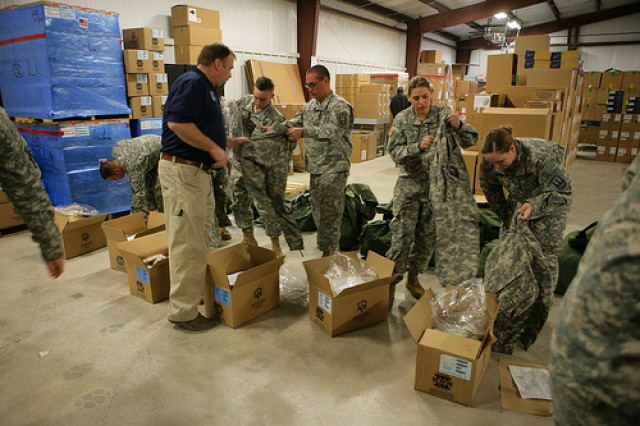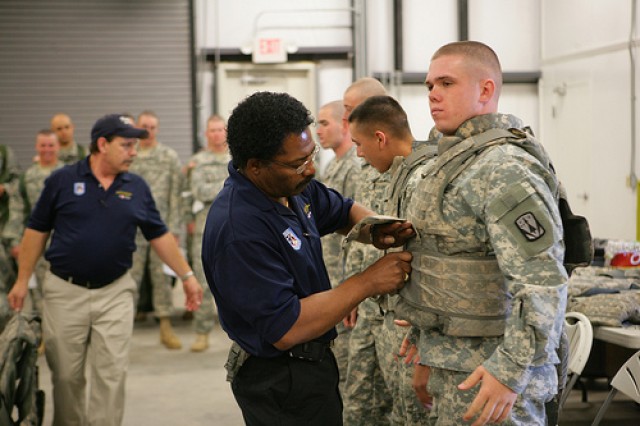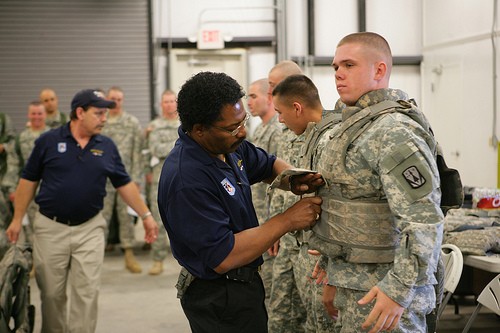FORT SILL, Okla.--In such a fast-paced world where people can get food on-the go, order anything online and send messages over the Internet almost as fast as they can type, it's nice to know the Army is able to keep up with the furious pace.
The Army is able to swiftly deploy Soldiers where they're needed and part of that is ensuring Soldiers are properly equipped.
The materials they need-they need fast, and that's where a rapid fielding initiative team comes in.
The Program Executive Office Soldier has seven RFI teams who travel all over the world setting up equipment in an assembly line of sorts.
RFI Team 3 came to Fort Sill April 27 to set up shop in Buildings 2104 and 2105. Mounds of boxes lined the walls of the buildings in what Christopher Grigsby, Directorate of Logistics director, said was about $6 million worth of gear. In just three days those boxes were emptied to more than 1,100 Soldiers at Fort Sill.
Normally it would be considered rude to size someone up upon first meeting them, but for this team of experts it's expected.
"Once they get right here Miss Genie will say let me see your hands and she's been doing this long enough she'll say try these gloves on. And nine times out of 10 they'll be the right size," said Chuck Cooley, team leader. Cooley explained that the units get the proper equipment depending on where they are deploying. The latest equipment changes include hiking boots, cold weather jackets and pants to endure rugged terrain and cool temperatures in Afghanistan. According to the PEO Soldier website, there are 73 different items RFI provides to enhance combat operations.
Team Sill coordinated this very important step in the deployment process through the Directorate of Logistics and PEO Soldier. According to Henry Cara, logistics management specialist, DOL has facilitated and directly supported 11 RFIs every month this year except for March. Cara said about 45 units with more than 5,000 active duty, Reserve and National Guard Soldiers have processed through Buildings 2104 and 2105 alone.
To the members of RFI Team 3 it's more than just a job; it's an honor.
"Most of the team is retired military and it's our way to still take care of Soldiers," said Cooley. He started working in RFI in 2003 and said most of his team has been with him since day one or joined him less than a year later. "We've been to Okinawa, Guantanamo Bay, Cuba, Honduras, Iraq and Kuwait. We're on the road quite a bit, but it's like still being in the Army. You either love it or you hate it. It's one of the two, and I love it," he said.
Cooley explained that getting the right fit is imperative for Soldiers' safety. In everyday life if a pair of pants or a jacket isn't tailored to someone's specific measurements, it can cause some discomfort, but it's usually not a big deal. He said when it comes to battle armor, like the improved outer tactical vest, those slight differences can create serious safety issues.
"It's not what size are you' I'm a medium regular. Well OK, we believe you, now try this on," said Cooley. "We make sure it fits. We have them sit down and make sure it's not pushing too much on their body, not pushing up on the shoulders. If they sit down and there's a gap between their body and the vest they are losing protection. You want it to protect everything that it can on Soldiers."
With the current operation tempo many Soldiers have received some of the equipment before in previous deployments. RFI has implemented a process called Lean Six Sigma so they don't get the equipment over and over again. In doing so, the Army has saved more than $84 million in the first 12 months alone, according to PEO Soldier.
When it comes to getting Soldiers the right size there can be some issues. Cooley said some Soldiers may have one foot that is slightly bigger than the other. For those instances they have an entire station of boxes with right boots in one size and left boots in another.
"We'll give them what they need. Yeah, we run into challenges but we work through them or make phone calls to see what we can do for these individuals. We're here taking care of Soldiers and that's our only business right now, if it weren't for these guys we wouldn't have a job."
After all the equipment is issued and scanned, Soldiers go over the list and confirm they have received everything they need. And as quickly as they came, the RFI team packs up and heads to their next location.
Cooley said they usually leave the buildings cleaner than when they found them, with no remnants of boxes, tape or paperwork. The evidence of their work can be seen however on Soldiers out on the battlefield.
According to the PEO Soldier website RFI has equipped nearly 1.5 million deploying Soldiers. "I tell the Soldiers, we're like Avis - we go where you go. If one Soldier says thank you after what we've done, for me it's all worth it," said Cooley.




Social Sharing